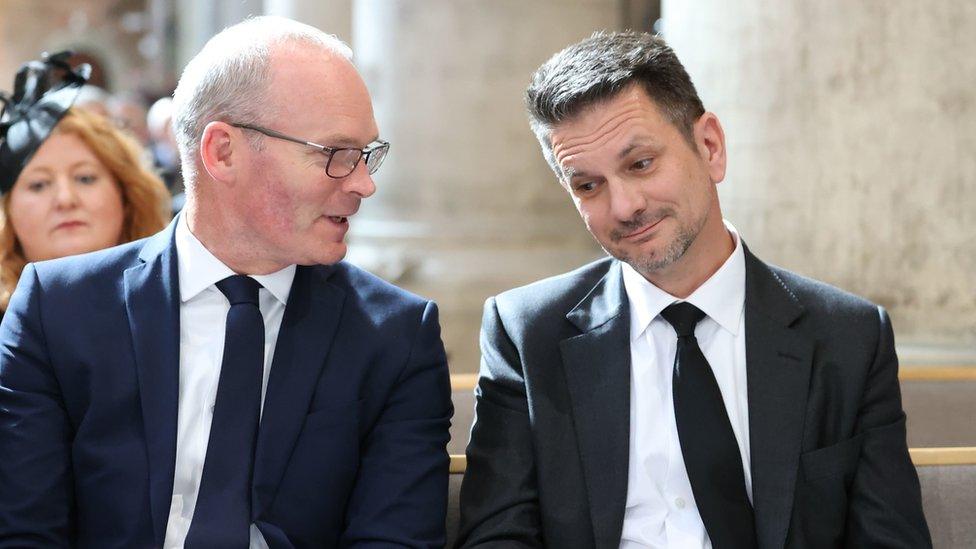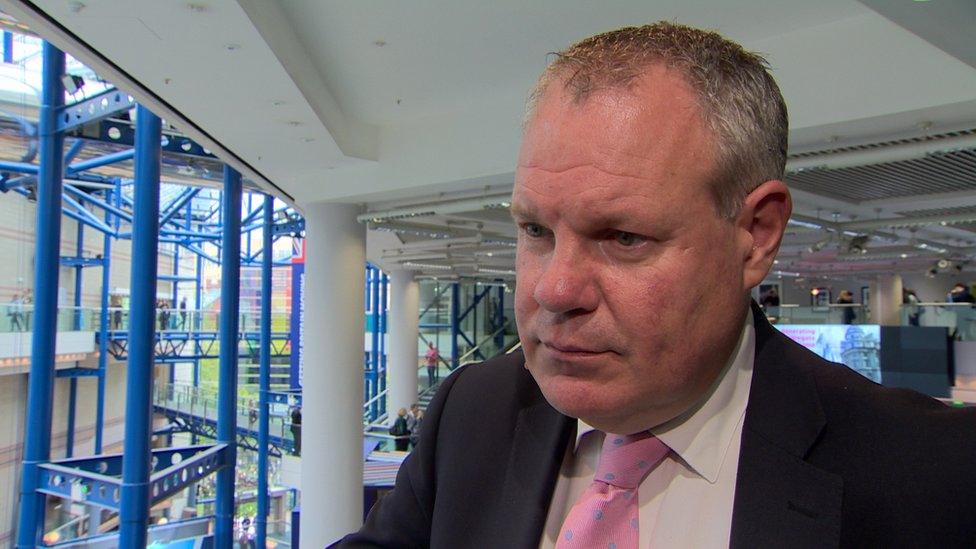NI Protocol: 'Mood music' has changed in protocol talks - Simon Coveney
- Published
- comments

Simon Coveney (left) says he welcomes the "change in course" from the UK government
The "mood music" has changed in discussions over the Northern Ireland Protocol, the Irish foreign minister has said.
Simon Coveney made the comments ahead of a meeting with Foreign Secretary James Cleverly on Thursday.
On Wednesday, government minister Conor Burns said he was "pretty bullish" about getting a deal with the EU.
Technical negotiations between the UK and EU are set to restart this week for the first time since February.
Mr Coveney said: "This is a very welcome change of course that the British government is engaging now seriously, as opposed to moving ahead with unilateral action which would certainly have caused a lot more problems than it would have solved."
On Tuesday, the Democratic Unionist Party (DUP) said it would not restore Stormont's institutions until protocol matters had been resolved.
'Rebuild trust'
Mr Coveney will also co-chair the British-Irish Intergovernmental Conference with Northern Ireland Secretary Chris Heaton-Harris on Friday.
"But certainly the mood music has changed quite fundamentally, we welcome that, and we will work on not only the relationships to rebuild trust, but also work on solutions in a practical way, and I think that process very much starts in earnest this week," Mr Coveney added.
Mr Burns, a former minister in the Northern Ireland Office, said he believed a "pragmatic solution" could be found with the EU.

Conor Burns said he believed a pragmatic solution could be found to deal with the Northern Ireland Protocol
Prime Minister Liz Truss said she was "determined" to see progress.
Speaking at the Conservative Party conference, she said it was important "to restore the east-west trading relationship".
The protocol, part of the UK government's Brexit deal to leave the European Union, keeps Northern Ireland aligned with the EU's single market to ensure free trade can continue across the Irish land border.


A failure to "prepare the ground" proved costly this week for the under fire prime minister and her big tax cutting plan.
The same charge can't be levelled at those back around the negotiating table trying to sort the protocol problems.
If anything, the ground is too well prepared with apologies and bullish predictions, raising expectations that a deal between the UK and EU is within touching distance.
Warm words alone won't bridge the massive gap which remains and a weakened and distracted Liz Truss now adds another potential hurdle.
The talks may have resumed after an eight-month break under her watch, but will the prime minister still be in charge if and when they conclude?

'A way through'
However, unionist politicians have protested against the protocol for resulting in additional checks being placed on some goods moving between Great Britain and Northern Ireland.
The EU's ambassador to the UK, João Vale de Almeida, said he hoped there would be progress reached in the "coming weeks".
Mr Burns, who is now a minister in the Department for International Trade, said the government's position is that goods travelling to Northern Ireland which are not meant for onward travel to the EU "should be treated differently to those goods which are going into the single market".
He told BBC News NI: "If we can find a way to recognise that reality, treat those differently, recognise the legitimacy of the United Kingdom's internal market on a par with the EU's single market, then I think there is a way through."
The DUP has blocked the functioning of Northern Ireland's legislative assembly and governing executive because it believes the protocol undermines Northern Ireland's position within the UK.
The party's Edwin Poots, Stormont's agriculture minister, said the impasse which has been created could lead to the "funeral of the Good Friday Agreement".
Mr Burns said it would be "very strange" if the Stormont institutions were not functioning ahead of the agreement's 25th anniversary in 2023.
He described the peace accord, which established power-sharing, as a "compromise that has worked".
Meanwhile, legislation which could override parts of the protocol is expected to return to parliament for a debate in the House of Lords next week.
Mr Burns described the bill as the domestic implementation of the UK's "tabled solutions" to the protocol issues.
However, he said "talks will evolve", adding "there's got to be a pragmatic way through this".